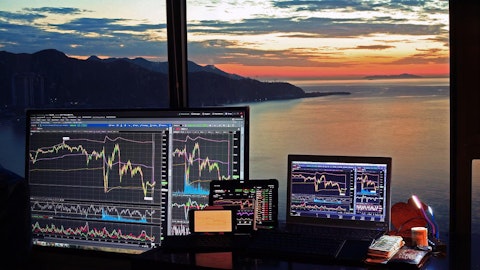Robert Berman: Yes. I mean I think, look Zach between the note offering and registered direct, I think we feel very confident that we can drive the Company to profitability, right in 2023. So, I think we feel good about where we are. And again, a lot of it comes from something that when we acquired STS they had already pioneered the concept of pay for data, right? So the difference is installing inductive loop for $40,000 and dig up the road and spent 30, 40 days to do it or put up a system that can do it as usually for a fraction of the cost right, in real time without all the damage that goes along with digging up the road and so on and so forth, right? So that’s where we see the growth coming from primarily urban mobility and it’s truly – I think it’s important to break this out, because I think – there’s self looks, there is so few several hundred people on this call, right?
And frankly you’re all the fortunate ones, right, because someday, there’ll be several thousand more, right? The concept of what we’re doing is disrupting something that’s been done for 60, 70 years if not more of the same way using technology that has not changed, okay, and that’s the point and they are mandated to do this and we can now do this with the technology that Rekor has that we’ve been developing for several years, right, which is the proficiency of edge processing, roadside machine vision and so forth and it starts with vehicle ID and vehicle recognition. And then you transfer that to the vehicle classifications and right? And this is something that the states have been looking for and hearing about, but nobody has delivered. So here we are, right.
So that’s why we have the confidence level, right, to be able to say that we believe we can do, what we’re going to do going into ’23 and ’24.
Zach Cummins: Understood. Well, thanks for taking my questions and best of luck here in the coming quarters.
Robert Berman: Yes, thanks, Zach.
Operator: And our next question comes from the line of , a Private Investor. Please proceed with your question.
Unidentified Analyst: Yes, thanks for taking my call. Definitely impressed with the management team and it shows reflection of ALPRs. One of my questions is, within the United States it seems to be a lot of activity with the contracts and technology, but outside the U.S., overseas besides Israel it’s been little quiet, can we expect that to change?
Robert Berman: Well, that’s a really good question. So let me start by saying this, almost every government, okay in the world, right? Even in very slowly developing countries right, how do they budget the roadways? They look at the tonnage going across the road over a period of time, 5, 10, 15, 20 years and they extrapolate an idea of what they think it might require to repair, replace, and maintain that road well. So they do this with very rudimentary ways. They do mechanical counting of vehicles and in some places they actually put people on roads and count vehicles, right? So everybody uses the same concept to figure out how to maintain and repair, replace the roadways. So it starts with that. It all starts with analytics and as David said earlier, planning and planning starts with data.
So if there is a different way to collect data on roadways, well, then that’s where it begins, right, so everybody across the globe does the same thing, right. So it starts with the ability to collect data and the beauty about what Rekor has done, it’s just created a single system that has multiple capabilities. So not only can we go and collect the data, right, and then tell you what’s crossing your roadways, how much tonnage the emissions from the tonnage is crossing the road, so on and so forth, but also can be used for public safety and if that, in other cases without touching the device, it’s a one device that goes after once its there, right, you can toggle things on, toggle things off. So I think what you’re going to see is that this is going to expand beyond the U.S. It’s going to extend well beyond the U.S. borders, right?
And we can tell you today that we know that there are companies installing inductive loops all around the world. They’re doing in South Korea, they are doing in Europe, they’re installing these things whole over the place because technology is pretty much the same. If you drive to any traffic intersection, if you look when you get to the intersection, you’ll see cuts on the road and what that is? That’s an inductive loop, so it feels the weight of your vehicle crossing it and then there’s some magnetic field there that measures the number of axles and it triggers a timer. Well, this is the 21st century, you don’t need to do that, right, so the answer to your question is the same technologies used outside the U.S. Certainly, almost and the majority of the developed world.
So hopefully, we’ll see it expand.
Unidentified Analyst: And also I believe, since I mentioned, Israel. I think I read somewhere plan on implementing the bus transit technology also in the future?
Robert Berman: Well, that’s the same thing what we’re doing with COTA and Ohio is we’re helping them route their buses because they’re able to schedule more real-time where the buses are so that somebody can look at their phone, which we’re all used to looking at and figure, okay, my bus is 3 minutes early, it’s 10 minutes late. I can plan my schedule. So again, this comes from the same technology and that’s the point, right? It’s one-piece of technology that does all of this, it does all of it, right? And for those of you that have been following Rekor for a few years, you know that we started with vehicle ID, right? So that’s where we got our start, license plate recognition, looking at the vehicle and from their machine learning takes over and you just train and train and train and train and you can look at different things.
So that’s exactly the point. So, whether you’re looking at bus schedules, train schedules, tractor-trailers pulling in and out of ports, it doesn’t matter what it is, okay, the system that we built can do all of that, right. So we’re here at the very early stages of it for whatever reason, roads, bridges, tunnels are not all exciting to the investment community. They brough us TikTok so that you can post a video, but this is probably the largest segment of the economy that there is when you look around the world, infrastructure, right. So you have to put a layer of digital infrastructure over part infrastructure and that’s what we’re doing. And someday, like I said there’ll be thousands and thousands of you on these calls, not just the several hundred that there are, so thank you for the question.
Unidentified Analyst: Yes, with also with the Oklahoma PR today and the uninsured motor vehicles, is that drawing interest from any other states also?



